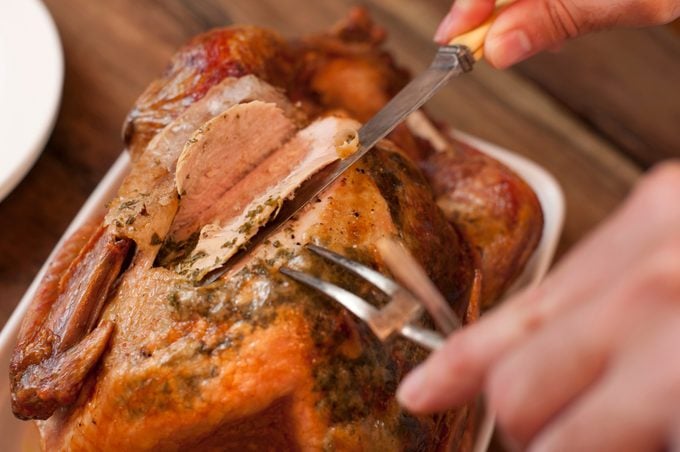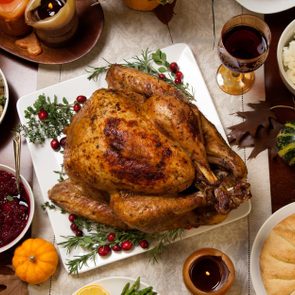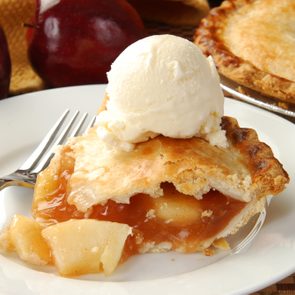Does Turkey Really Make You Sleepy?
Updated: Nov. 19, 2021
Blame your Thanksgiving dinner food coma on the trimmings, not the bird.
Why would turkey make you sleepy?
Just as traditional as the Thanksgiving turkey is the overstuffed and satisfied sleepiness that follows. And although society has historically pointed a finger at turkey, it turns out that it’s not the main cause of your post-feast fatigue.
Why blame turkey for the fatigue in the first place? In a word: tryptophan. This chemical is an essential amino acid that is a component of the feel-good chemical serotonin as well as a precursor to the sleep-inducing hormone, melatonin.
Your body doesn’t produce tryptophan naturally so you have to get it through the food you eat.
Turkey is one of the foods famous for being high in tryptophan which is why it’s so often blamed for the post-dinner crash on Thanksgiving. But that reputation may be overrated, says Darren Scott, PhD, a food scientist at Oklahoma State University.
Tryptophan can be found in all kinds of foods, ranging from dairy products and nuts to meats and tofu. And not only that, but turkey doesn’t have higher levels of tryptophan than any other common meat, he says.
In fact, gram for gram, even cheddar cheese contains greater amounts of tryptophan than turkey. So if the tryptophan in turkey really did cause our post-Thanksgiving drowsiness, we’d experience the same strong, lethargic sensation every time we ate chicken, beef, cheese, or nuts.
And, as we know, this obviously isn’t the case.

But if the turkey’s tryptophan isn’t to blame for our sleepiness on Thanksgiving, what is?
Thanksgiving dinners are both heavy in the amount of food consumed and in the types of foods traditionally served.
Both of those things can contribute to the infamous food coma, Scott says. (These are the health effects of overeating on Thanksgiving.)
Culprit No. 1: What you eat
Did someone say mashed potatoes, pies, stuffing, cornbread, green bean casserole, fresh rolls, and yams covered in marshmallows?
“Lots of traditional Thanksgiving foods are high in sugar and simple carbohydrates, which contribute to drowsiness,” he says.
The combination of protein and carbs may be particularly sleep-inducing, according to a study published in Obesity Research. Eating carbs causes the body to release more insulin into your blood, which increases amino acid absorption, including tryptophan. The extra tryptophan then increases the amount of serotonin in your brain. Serotonin, in turn, is a precursor to melatonin, the hormone that makes you feel drowsy.
The study also found that eating lots of sugary carbs can affect your mood in other ways, increasing feelings of depression and anxiety. (Do the holidays make you anxious? You’re not alone in your autumn anxiety—here’s how to cope.)
Culprit No. 2: What you drink
Alcohol is another reason your eyelids may grow heavy, says Amanda Kostro Miller, RD, a licensed dietitian/nutritionist who serves on the advisory board for Fitter Living.
On Thanksgiving, many adults drink beer, wine, or cocktails throughout the day and with their meals. Alcohol is a central nervous system depressant with fast-acting sedative effects.
It’s also high in quickly digested carbohydrates and may reduce your inhibition, causing you to eat more throughout the day, she adds.
Thinking of choosing punch instead?
“Sugar-sweetened beverages, including soda, fruit juice, sparkling ciders, sports drinks, sweet tea, and coffee drinks can also make your blood sugar spike and then drop, making you ‘crash,’ ” she says. “This up and down can not only affect your energy levels but it can also make your mood fluctuate.”
Culprit No. 3: How much you eat
Another factor may be the amount of food you eat at Thanksgiving, Scott says. The average festive meal contains 229 grams of fat and 3,000 to 4,500 calories, according to estimates by the Calorie Control Council.
That’s more than most men and women eat in an entire day. Digesting all that food requires a lot of energy, so the body sends more blood to your digestive system to manage the load.
This means your body has less energy for other activities, like doing the post-meal dishes, and that makes the couch look even more appealing.
If you weren’t able to resist the siren call and ending up overeating, don’t beat yourself up. Use these tips to recover from a Thanksgiving binge.
How to avoid the post-Thanksgiving dinner food coma
If you swear that you feel particularly sleepy after your Thanksgiving meal, it’s true—you’re not imagining it. But don’t blame the turkey.
If you don’t want to snore on the floor after you’ve cleared your plate, cut back on the sugar, carbs, and booze.
Try not to load your plate; eat moderate portions—you can always have leftovers tomorrow, Kostro Miller says.
Next up, check out the best and worst Thanksgiving foods for your weight.



